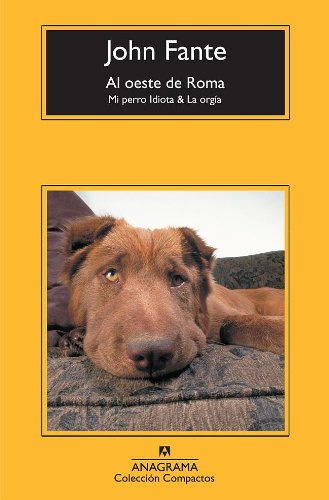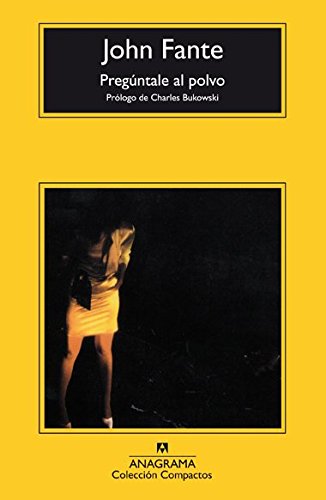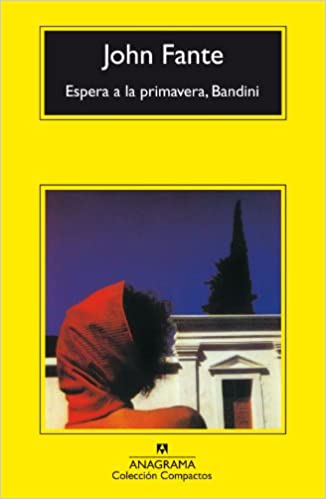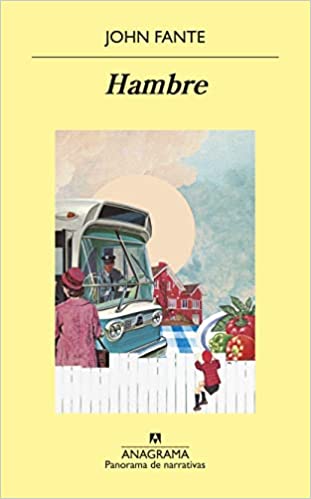Inspiration from Bukowski and rescued thanks to this particular mentor. John fante He already has that something of a legendary author in an America subjected to its deepest contradictions in the mid-20th century. A dichotomy between the thriving American style of prosperous lifestyle and the social and political shadows; especially in terms of still institutionalized racism, mafias and an economic depression whose impact remained embedded in everyone's imagination for decades.
It is easy to imagine that a writer as Fante, critical and ironic, he will find a vein in that prodigal sociopolitical tightrope in arguments deep into the lives of millions of characters that made up the diverse social cosmos.
The city of Los Angeles as a paradigm of a new conquest of the west, of an intense adventure of el dorado projected to that search for prosperity in a huge country championed by its freedom made economic liberalism in the first instance. The same merciless liberalism to separate anyone who is left out of a productive circle.
But brief circumstantial analysis aside, Fante novels They do not stop composing lives, valid characters at all times of a middle or lower class that aspires to levels of well-being projected under the current slogan.
And Fante uses irony and sarcasm to blur everything, to flay those dreams. Laughing at so much nonsense is a first step for any self-respecting fatalist. It is already known that a pessimist is a well-informed optimist. And every novel that satirizes ends up revealing atrocious truths about the deep miseries of the established.
Even so, the narrative richness itself of Fante's novels rises above criticism in search of that empathy of raw realism that tells us about universal characters around fundamental emotions such as love or naturally egocentric ideals of the individual exposed to life in society.
Only, when emotions and expectations end up truncated they awaken a dissatisfaction that can turn towards doom, as happens with most of the protagonists of these clearly Fante stories.
Top 3 best John Fante novels
Ask the dust
Arturo Bandini, the most emblematic character of Fante and the author's own transmuted protagonist who would inspire Chinaski, Bukowski's alter ego, finds in this novel his most interesting line of life.
Budding writer Bandini waits for that magical opportunity that lurks like a destiny that takes time to find it. Arturo is still young and still believes that he can wear out his life like the cursed author who writes the story that will later be told by one of his future biographers.
Meanwhile, his time goes by between the destructive love with Camilla, the general depression of the 30s, his fascinating ideas between practically megalomaniacal delusions that he never finishes writing and his passing through a city of Los Angeles in which Bandini happens to be one of the losers of a system in economic and moral bankruptcy.
The difference in perspectives between the main character and the reader who sees Bandini consume his life generates that sensation of acid humor, almost black on a disparity between reality and perception of the protagonist that in the end appears as the same thing that can happen to any reader.
Wait for spring, Bandini
In second place in my quality ranking of Fante's works, we find his debut work. This is a novel that brings us closer to the first Bandini, to the boy who slowly becomes a man amid feelings of inadequacy due to his immigrant origins.
As if that weren't enough, we know how Bandini had to survive without that fatherly love that sustained the rest of the boys around him. And of course the deficiencies mark.
In Bandini's case, the lack of references becomes a whirlwind that guides him through his uncontrolled youth in contrast to a mother as religious as she is incapable of controlling her son.
Bandini's youth is that bitter spring that announces the title, sprinkled with the color and life of youth but oriented towards that path of the perdition of every self-respecting anti-hero or social misfit.
West of rome
For Henry Molise, the city of Rome is like an anchor that unites him with another type of being, with an idealized civilization facing the boredom of a world dwarfed for him.
That remote past of humanity affirms its sadness to live under the auspices of a writer's profession that after the fifties has not deported the glory that it hoped for.
His Idiot dog, despite his repellent presence, becomes a more faithful confidant than any of the other members of the family, transformed into characters whom he has learned to despise through disgust. A novel whose transitions from humorous to existential sadness awaken masterfully drawn contrasts.
Probably his novel most focused on that social institution that is the family, with the most stark treatment of coexistence, manias and resentments.

Other recommended books by John Fante
Hunger
In 1994, Stephen Cooper, biographer of John Fante, scholar of his work and preparer of this edition, visited the writer's widow, who after many conversations allowed him to enter a secret room where manuscripts, drafts, numbers of old magazines and other papers. Among them were the eighteen writings that appear in this volume, seventeen of which had been published in magazines now defunct and had not been published since.
In these rescued texts we see Arturo Bandini riding again and other copies of the endearing character. A Bandini child, adolescent and adult, with his pedantry, his literary delusions, his naive violence, his poorly digested readings and his irresistible sense of humor, somewhere between absurd and cruel.
The series is completed by two sketches for an unfinished novel about Filipino immigrants and a prologue conceived for Ask the Dust, a masterful and impressive prose poem that summarizes in the key of tragedy what we read in the key of farce in the novel version.
John Fante appears here, once again, as an outstanding heir to the two most devastating satirists of his grandparents' generation, O. Henry and Mark Twain, whom he surpasses in bitingness and sarcasm and above all in economy of means. Fante is an undisputed master of the novella and the short story, able to paint a harrowing, violent, or embarrassingly ridiculous environment with two or three brushstrokes, and sometimes just one.



